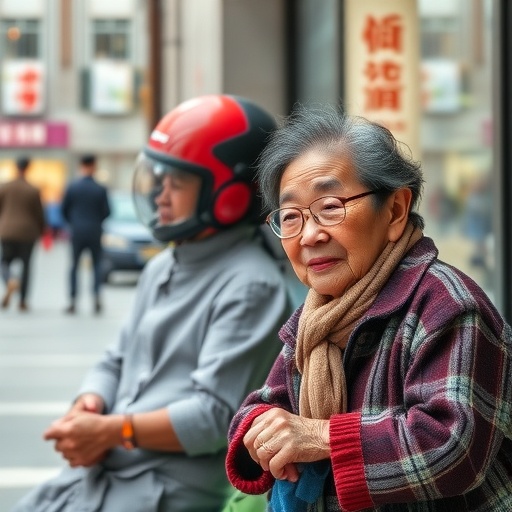Excessive reassurance-seeking behavior is an important yet often overlooked phenomenon among older adults, particularly in urban settings. Recent research has shed light on how this behavior manifests in Chinese new urban older adults, revealing significant implications for their mental health and overall well-being. In this exploration, we delve into the intricate connections between excessive reassurance-seeking, anxiety levels, attention to negative information, and resilience among this demographic.
In the modern landscape of urbanization, many older adults find themselves grappling with significant changes in their environment and social structures. The rapid pace of urban life can evoke feelings of uncertainty and anxiety, pushing some individuals to seek excessive reassurance from those around them. This phenomenon is particularly evident among newer urbanites in China, who may feel isolated and disconnected from their previous communities.
The study conducted by Sun, Wrzus, and Lv draws attention to the specific manifestations of reassurance-seeking behavior among older adults in urban China. It investigates how the desire for validation and comfort can, paradoxically, contribute to heightened anxiety. This study presents a nuanced understanding of the psychological dynamics at play, suggesting that while reassurance-seeking might provide short-term relief, it can also lead to increased dependence on external affirmations, thereby exacerbating feelings of anxiety.
The findings indicate that attention to negative information significantly influences this behavior. In today’s digital age, where news and social media constantly bombard individuals with negative stimuli, older adults are particularly vulnerable to the psychological impacts of this information overload. The tendency to focus on negative news can skew perceptions, leading to increased apprehension about personal safety, health, and social interactions. This heightened awareness of negativity can compel older adults to seek reassurance more frequently, thereby creating a cycle that perpetuates their anxiety.
Resilience emerges as a critical factor in this dynamic. The study suggests that individuals who demonstrate higher levels of resilience are less likely to engage in excessive reassurance-seeking behavior. Resilience, characterized by the ability to adapt and recover from adverse situations, can serve as a buffer against the anxiety that often accompanies urban life. Those who possess strong coping mechanisms and social support networks are better equipped to navigate the challenges of their environment without succumbing to the need for constant reassurance.
Moreover, the exploration of cultural factors in this research is essential. In Chinese society, the value placed on familial and community ties can influence how older adults express their emotional needs. The pressure to maintain harmony and avoid burdensome relationships may deter some older adults from openly discussing their anxieties, leading instead to increased reassurance-seeking behaviors. This cultural context underscores the importance of understanding the social frameworks that shape the psychological responses of individuals.
As urbanization continues to reshape communities, mental health support for older adults must evolve. Interventions should focus on fostering resilience and encouraging healthier coping mechanisms, such as community engagement and social interaction. By helping older adults build stronger support networks, they may feel less compelled to seek excessive reassurance and, in turn, reduce their anxiety levels.
In conducting their research, Sun, Wrzus, and Lv employed a combination of qualitative and quantitative methodologies to gain a comprehensive understanding of the behaviors and psychological states of the participants. Through surveys and interviews, they gathered data on reassurance-seeking tendencies, anxiety symptoms, and resilience indicators, allowing for a detailed analysis of the correlations among these factors. Their findings contribute to a growing body of literature addressing mental health in aging populations, emphasizing the need for targeted strategies to assist those struggling with these issues.
As society progresses, it becomes increasingly clear that mental health cannot be divorced from the broader socio-economic and environmental contexts in which individuals live. The implications of this research extend beyond academic inquiry, offering practical insights for policymakers and mental health professionals. It highlights the necessity for community-based programs that cater specifically to the psychological needs of older adults in urban environments.
The consequences of unchecked anxiety in older adults can be profound. Social isolation, depression, and deteriorating physical health are just some potential outcomes that can stem from a lack of effective coping mechanisms. For this reason, addressing excessive reassurance-seeking behaviors is not merely an academic exercise; it is a public health necessity.
In conclusion, the interplay between excessive reassurance-seeking, anxiety, attention to negative information, and resilience among Chinese new urban older adults presents a complex puzzle that demands attention. Sun, Wrzus, and Lv’s research provides a valuable framework for understanding these dynamics, emphasizing the need for culturally aware mental health interventions. As urbanization continues to evolve, promoting mental health literacy and resilience in older adults will be crucial in fostering healthier, more vibrant communities.
In the rapidly changing urban landscape, it’s essential to prioritize the mental well-being of older adults. As researchers continue to uncover the intricacies of psychological behavior in this demographic, it is hoped that their findings will lead to innovative solutions and greater awareness of mental health challenges facing older individuals. The journey toward understanding and alleviating anxiety in urban older adults is ongoing, with a bright horizon of potential for fostering resilience and creating supportive environments for all.
Subject of Research: Excessive reassurance-seeking and anxiety among Chinese new urban older adults.
Article Title: Excessive reassurance-seeking and anxiety among Chinese new urban older adults: the role of attention to negative information and resilience.
Article References:
Sun, Y., Wrzus, C. & Lv, S. Excessive reassurance-seeking and anxiety among Chinese new urban older adults: the role of attention to negative information and resilience.
BMC Geriatr 25, 680 (2025). https://doi.org/10.1186/s12877-025-06382-x
Image Credits: AI Generated
DOI:
Keywords: excessive reassurance-seeking, anxiety, older adults, urbanization, resilience, mental health.




